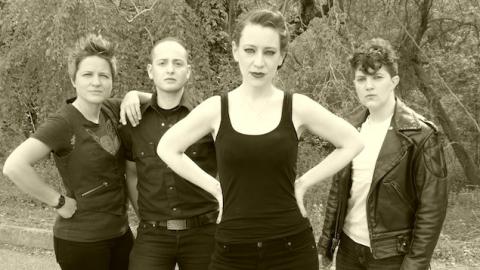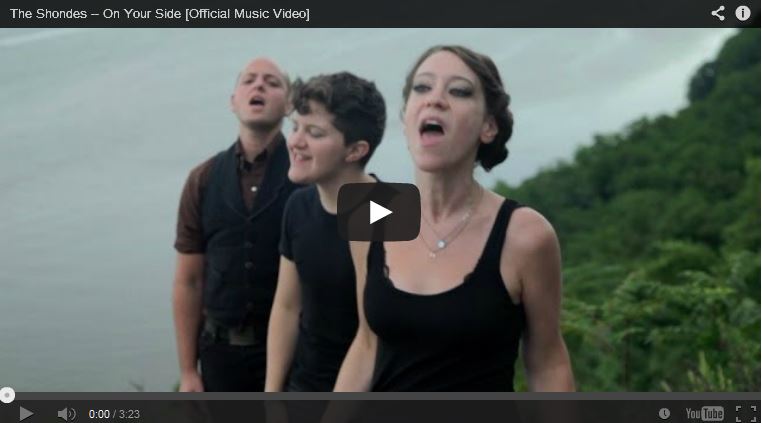The idea of "the Jewish Community" gets thrown around a lot, even though we have never been a singular or remotely unified group. Jews have wildly different traditions, experiences, and opinions about what Jewish-ness even is. Are The Shondes part of this often-invoked, elusive community? In many ways the answer is clearly yes. But when its institutional guardians draw borders around it to keep out people and ideas they deem unsavory, out-of-line, or "off-brand," it is an incredibly fraught belonging, to say the least. That kind of policing is the antithesis of the Judaism we love.
One of our favorite jokes is the one about the four rabbis, three of whom always band against the other in arguments. When the fourth gets G-d to intercede for him, the three respond: "Nu? So now it's three against two." We were always, perhaps naively, very comfortable with the idea that in Judaism debate is inevitable and invaluable. (How else would the Talmud exist?) Coming to support Palestinian rights, then, even in the face of hardline institutional Zionism, didn't make us feel any less Jewish or less entitled to community. After all, what could be more Jewish than asking tough questions and fighting injustice?
Of course we've learned a lot since then. When the DC Jewish Community Center (DC JCC) asked us to play the Washington Jewish Music Festival this year, we had no illusions about their politics. We accepted the offer in a spirit of optimism, believing that despite the political chasm between us, we are part of the community they supposedly serve, and ought to be able to get on stage and play our songs - most of which are about love, survival, and hope - for anyone who wants to hear them. Then they abruptly uninvited us last week, citing our past comments on Israel. Apparently the mere presence of those who don't share their views is intolerable.
In light of this blacklisting debacle, it seemed we should offer a bit about where we are coming from. We are best friends who have shared 14 intensely transformative years in New York. We have an unmistakable camaraderie, a great platonic love born of shared hardship and joy, struggle, and occasional victory. We built our friendship in the streets protesting, in our apartments lighting Shabbes candles, and on stage performing. Music, Judaism, and activism have proven to be inseparable, essential parts of our lives.
In college at the New School we occupied pro-war President Bob Kerrey's office, demanded divestment from arms manufacturers, and even formed an anti-Occupation "Hillel" (we had the audacity to declare it "Hillel" without anyone's permission, before there was the inspirational Open Hillel). We watched the Twin Towers fall, in our pajamas in the street, and then watched a disturbing, reactionary patriotism unfold. We saw Arab, Muslim, and South Asian friends demonized and attacked in the shameful racist backlash that overtook our city. We protested, organized, and tried to figure out what solidarity was.
One particularly depressing day, Louisa convinced Eli to try playing punkrock violin with her, and we stumbled upon the musical collaboration that would become our life. Songwriting is rigorous work that helps us feel more whole; it engages us spiritually, politically, intellectually, and emotionally. When we perform, we give audiences everything we have, all our vulnerability and strength, and the connection between us is palpable. It feels sacred and radical, and in moments, like a glimpse of a better world.
Jewish ritual - on holidays, shabbes, and whenever else we needed it - also became a source of comfort, connection, and strength, and ritual events became sites for organizing. We joined Jews Against the Occupation, where we had the honor of working on the After Exodus seder. It took place on the last day of Passover as the sun set and the holiday ended, and focused on asking "after 8 days of reflecting on Jewish persecution and liberation, how do we respond to the oppression of Palestinians in our names?" There has never been much separation for us between doing Judaism and doing activism.
Though opposing occupation and Jewish nationalism made good sense to both of us, Louisa's experiences with the International Solidarity Movement in the West Bank deepened how those political positions felt. They became much more visceral, particularly when Louisa described seeing Israeli soldiers terrorize Palestinian families and then spray paint stars of David on their homes, using the Jewish symbol as a mark of conquest. The Israeli occupation of Palestine is brutal and unjust, and its claims on Judaism are disgraceful distortions of anything we have ever found meaning in.
When we formed The Shondes we had no expectation of support from mainstream Jewish institutions. We were, after all, self-identified disgraces with a devoted, but small following. From their perspective we were ignorable, irrelevant. But that changed when we started receiving serious critical praise, and in their endless quest to appeal to young, hip Jews, we finally registered on their radar. How revealing that they invited us and then canceled, betraying their priorities so clearly. Evidently it's more important to maintain an old guard party line on Israel than to "broaden the tent." Rest assured, young and alienated Jews will get that message loud and clear: keeping critics of Israel out is more important than inviting you in.
We stand in solidarity with Palestine because Judaism calls us to the work of ethical existence, to grapple with power and privilege, to notice and resist what is unjust. We support the Boycott, Divestment, Sanctions Movement (BDS) because it pressures Israel to comply with international law: to end the illegal occupation, ensure refugees their right to return home, and guarantee full rights to Palestinian citizens of Israel. Its tactics have been used throughout history to draw attention to and demand accountability for injustice, yet the DC JCC has treated our position like treason, grounds for excommunication. Their reaction is not only comically punitive, but embarrassingly retrograde! Sooner or later they will realize that increasing numbers of Jews oppose Israel's actions in our names, and many of those who don't endorse BDS unequivocally support open conversation of it. No one wants to be told what to think, threatened for asking questions, or punished for taking a stand. What an irony that institutions whose missions focus on protecting Judaism's future are writing themselves out of it.
Through some Jewish numerology we won't subject you to (ask if you want to know!), the tzitzit (fringes) on a tallis (prayer shawl), are said to represent both the heart (lev) and our commandments (mitzvot). Sometimes called G-d's heartstrings, the fringes are an enduring reminder of our core beliefs and principles, our capacity for love and empathy, our responsibilities in the world. Some will try to coerce us into silence on Israel, but they will fail - the conversation is happening whether they like it or not. Judaism is not owned by these self-appointed arbiters of Jewish propriety; it belongs to all of us. We are a part of the Jewish community as much as such a thing exists, and we are happy to remain on its fringes. We will make our Jewish future here.
[Elijah Oberman and Louisa Rachel Solomon are the violinist and lead singer of Brooklyn rock band The Shondes.]
The Shondes - On Your Side [Official Music Video]



Spread the word